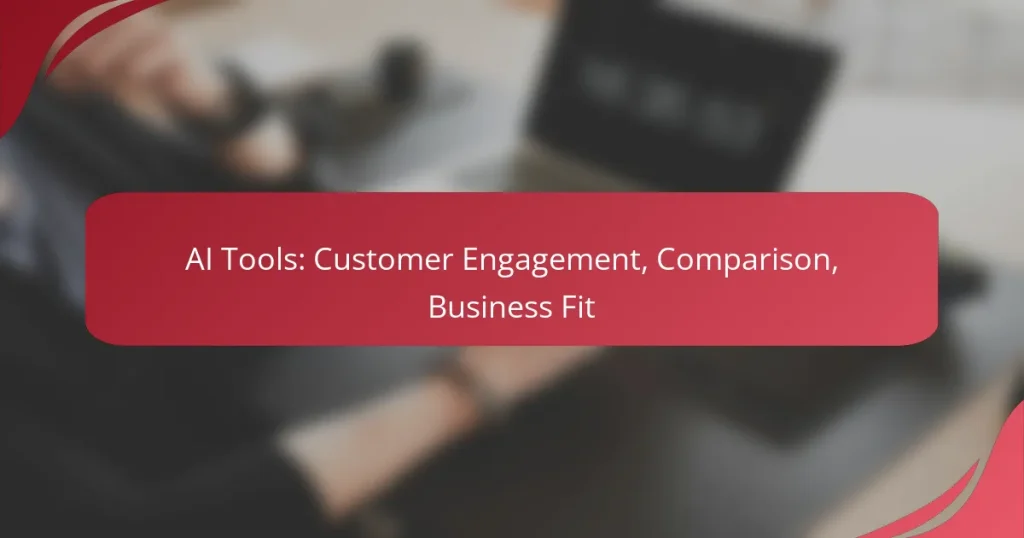AI tools play a crucial role in enhancing customer engagement by delivering personalized experiences and real-time support in e-commerce. By analyzing customer behavior and preferences, these technologies foster improved satisfaction and loyalty. When comparing AI tools, it’s essential to consider their features, pricing, integration capabilities, and user feedback to find the best fit for your business needs.
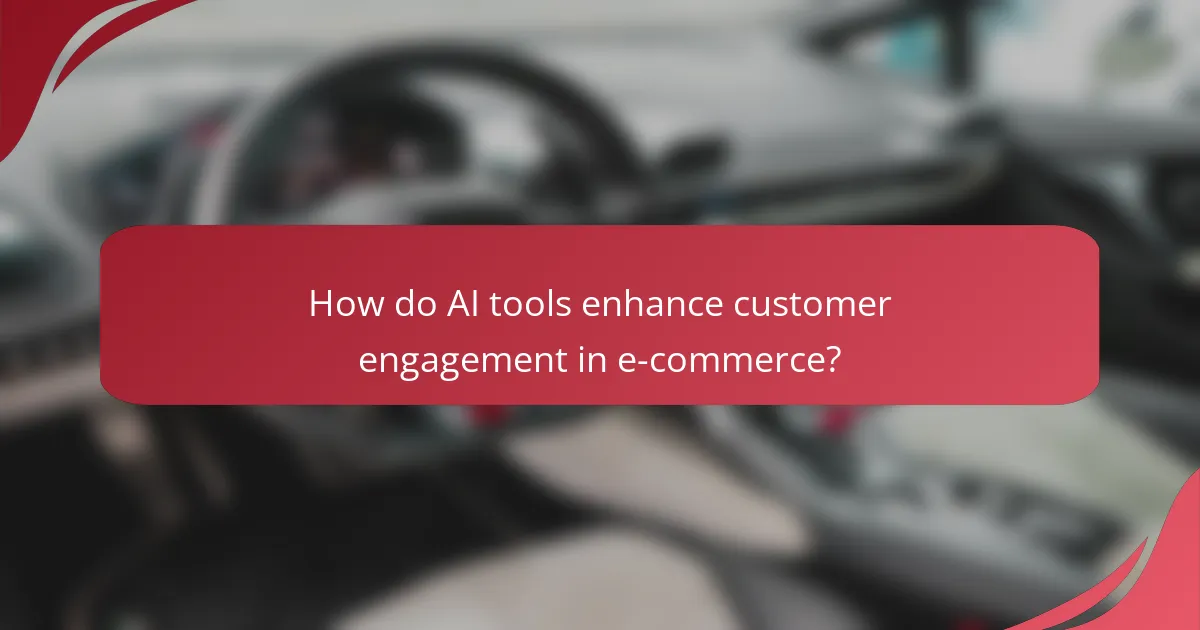
How do AI tools enhance customer engagement in e-commerce?
AI tools significantly enhance customer engagement in e-commerce by providing personalized experiences, real-time support, and targeted communication. These technologies help businesses understand customer behavior and preferences, leading to improved satisfaction and loyalty.
Personalized recommendations
Personalized recommendations use AI algorithms to analyze customer data and suggest products tailored to individual preferences. This approach can increase conversion rates by showing customers items they are more likely to purchase based on their browsing and purchasing history.
For effective implementation, ensure your recommendation engine is regularly updated with new data and trends. Consider using collaborative filtering or content-based filtering techniques to refine suggestions.
Chatbots for real-time support
Chatbots provide instant customer support, answering queries and resolving issues 24/7. This immediate assistance can enhance user experience and reduce wait times, making customers feel valued and understood.
When deploying chatbots, focus on training them with common questions and scenarios. Ensure there is an option for customers to connect with a human representative if their needs are not met by the bot.
Email automation for targeted campaigns
Email automation allows businesses to send personalized messages to customers based on their behaviors and preferences. This targeted approach can lead to higher open and click-through rates, as customers receive content relevant to their interests.
To maximize effectiveness, segment your email lists based on customer demographics and purchase history. Use A/B testing to optimize subject lines and content for better engagement.
Sentiment analysis for feedback
Sentiment analysis tools evaluate customer feedback from various sources, including social media and reviews, to gauge overall satisfaction. This insight helps businesses identify areas for improvement and understand customer sentiment towards their brand.
Implement sentiment analysis by integrating it with your customer relationship management (CRM) system. Regularly review the insights to adapt your strategies and address any negative feedback promptly.
Behavior tracking for insights
Behavior tracking involves monitoring customer interactions on your website to gather data on their preferences and habits. This information can inform marketing strategies and product offerings, enhancing overall customer engagement.
Utilize analytics tools to track key metrics such as page views, time spent on site, and conversion rates. Regularly analyze this data to identify trends and adjust your approach to meet customer needs effectively.
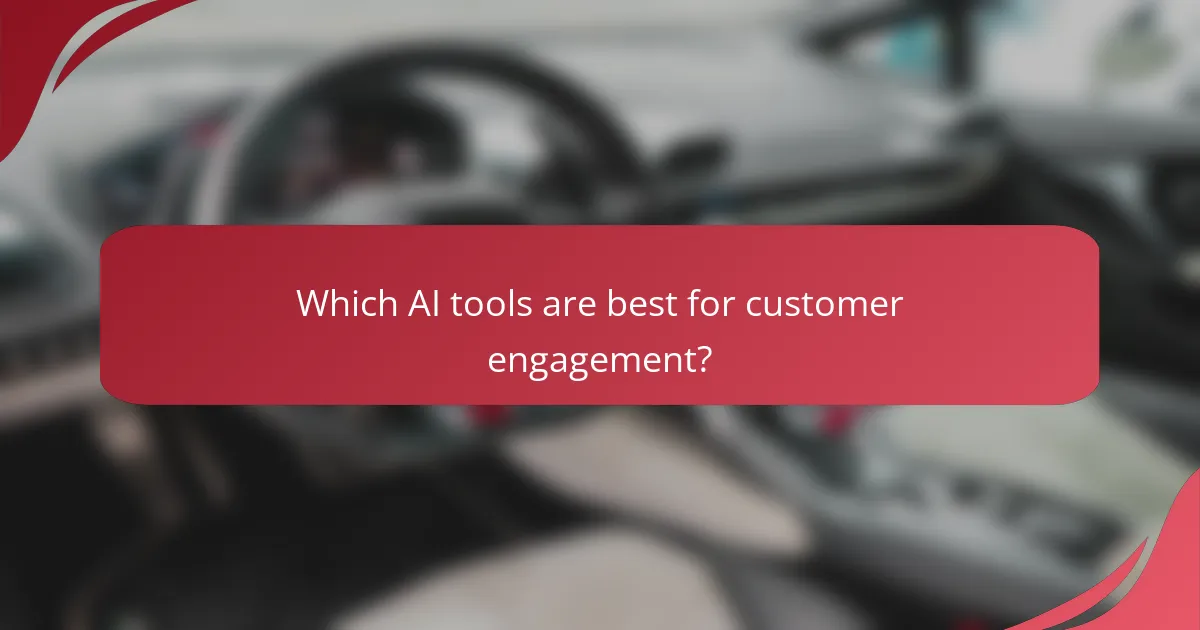
Which AI tools are best for customer engagement?
The best AI tools for customer engagement enhance interactions and streamline communication between businesses and their customers. Key options include Salesforce Einstein, HubSpot AI, Zendesk AI, and Intercom, each offering unique features tailored to different business needs.
Salesforce Einstein
Salesforce Einstein integrates AI capabilities into the Salesforce platform, allowing businesses to personalize customer interactions based on data insights. It analyzes customer behavior and preferences to recommend tailored solutions, improving engagement and satisfaction.
Consider using Salesforce Einstein if your business already utilizes Salesforce CRM, as it seamlessly enhances existing workflows. However, be mindful of the costs associated with advanced features, which can add up depending on your usage and scale.
HubSpot AI
HubSpot AI offers tools that automate marketing, sales, and customer service tasks, enabling businesses to engage customers more effectively. Features like predictive lead scoring and chatbots help prioritize customer interactions and provide timely responses.
This tool is particularly beneficial for small to medium-sized businesses looking to streamline their processes without extensive technical expertise. Keep in mind that while HubSpot has a free tier, advanced functionalities may require a subscription, so evaluate your needs carefully.
Zendesk AI
Zendesk AI enhances customer support by automating responses and providing insights into customer inquiries. Its AI-driven chatbots can handle common questions, allowing human agents to focus on more complex issues, thus improving overall efficiency.
For businesses with a high volume of customer interactions, Zendesk AI can significantly reduce response times and improve customer satisfaction. However, ensure your team is trained to manage the transition to AI-assisted support to avoid potential pitfalls in customer experience.
Intercom
Intercom is designed for real-time customer engagement through messaging and chat solutions. Its AI capabilities help businesses interact with customers at critical moments, offering personalized assistance and recommendations based on user behavior.
This tool is ideal for companies that prioritize proactive communication. However, be cautious of over-automation; maintaining a human touch is essential for building lasting customer relationships. Regularly review engagement metrics to optimize your strategy.
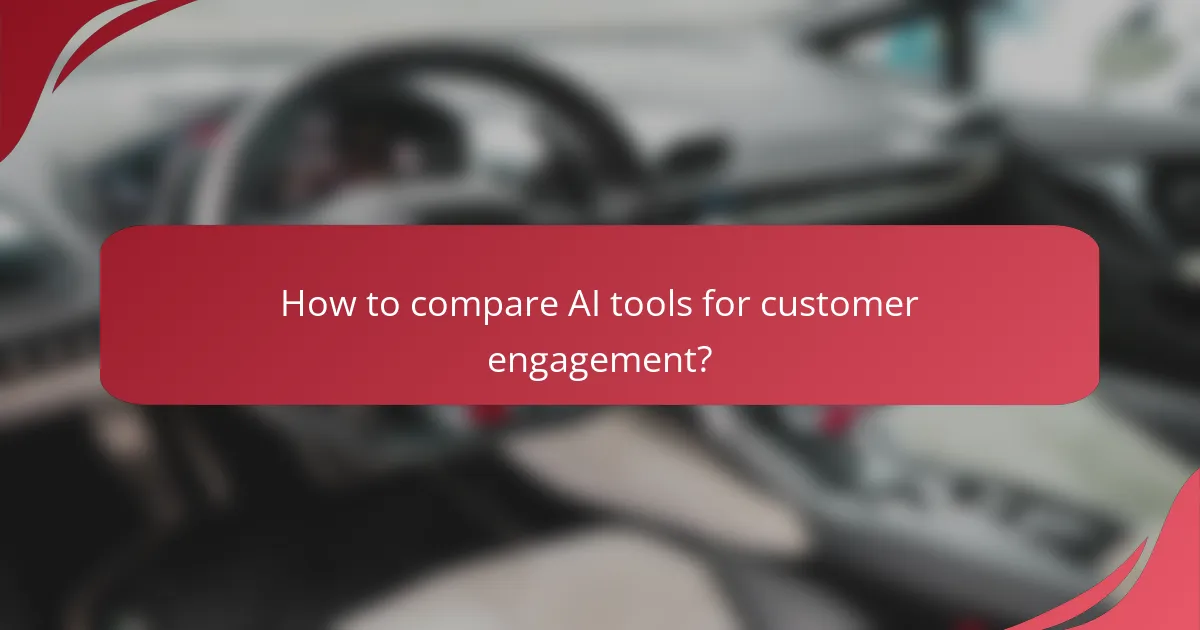
How to compare AI tools for customer engagement?
To effectively compare AI tools for customer engagement, focus on their feature sets, pricing models, integration capabilities, and user feedback. Evaluating these aspects will help you identify the best fit for your business needs and customer interactions.
Feature set comparison
When comparing feature sets, look for tools that offer capabilities such as chatbots, personalized messaging, and analytics. Some tools may excel in natural language processing, while others might provide robust CRM integrations. Prioritize features that align with your customer engagement strategy.
For example, if your business relies heavily on social media, choose a tool that integrates well with platforms like Facebook and Instagram. A feature comparison table can help visualize strengths and weaknesses across different options.
Pricing models
Pricing models for AI customer engagement tools can vary significantly, ranging from subscription-based fees to pay-per-use structures. Some tools may offer tiered pricing based on the number of users or features, while others might charge a flat monthly rate.
It’s essential to evaluate the total cost of ownership, including any hidden fees for additional features or integrations. Consider tools that provide a free trial or a money-back guarantee to assess their value before committing.
Integration capabilities
Integration capabilities are crucial for ensuring that your AI tool works seamlessly with existing systems. Look for tools that offer APIs or pre-built integrations with popular platforms like Salesforce, HubSpot, or Zendesk.
Assess how easily the tool can connect with your current tech stack. A well-integrated tool can enhance data flow and improve customer insights, ultimately leading to better engagement outcomes.
User reviews and ratings
User reviews and ratings provide valuable insights into the real-world performance of AI tools. Check platforms like G2, Capterra, or Trustpilot to see how users rate their experiences regarding ease of use, customer support, and overall satisfaction.
Pay attention to both positive and negative feedback. This can highlight potential issues or strengths that may not be apparent from feature lists alone. Aim to choose a tool with consistently high ratings and positive user testimonials.

What criteria should businesses consider for AI tool selection?
Businesses should evaluate several key criteria when selecting AI tools, including their size, industry-specific requirements, and existing technical infrastructure. These factors help ensure that the chosen solution aligns with operational goals and enhances customer engagement effectively.
Business size and scale
The size and scale of a business significantly influence the choice of AI tools. Smaller businesses may benefit from cost-effective, user-friendly solutions that require minimal setup, while larger enterprises often need robust systems capable of handling vast amounts of data and complex integrations.
For example, a startup might opt for a simple chatbot solution to manage customer inquiries, whereas a multinational corporation might require an advanced AI platform that integrates with multiple systems and supports various languages. Assessing the scale helps in selecting tools that can grow with the business.
Industry-specific needs
Different industries have unique requirements that can dictate the suitability of AI tools. For instance, retail businesses may prioritize tools that enhance personalized shopping experiences, while healthcare providers might focus on compliance and patient data security.
When evaluating AI tools, consider the specific challenges and opportunities within your industry. For example, a financial services firm may need AI solutions that comply with regulations like GDPR, while a travel agency might seek tools that optimize customer engagement through personalized offers.
Technical infrastructure
The existing technical infrastructure of a business plays a crucial role in AI tool selection. Companies must assess their current systems, data management practices, and integration capabilities to ensure compatibility with new AI solutions.
For instance, a business with a cloud-based infrastructure may find it easier to implement AI tools that are designed for cloud environments. Additionally, understanding whether the organization has the necessary data quality and volume to train AI models is essential for effective implementation.
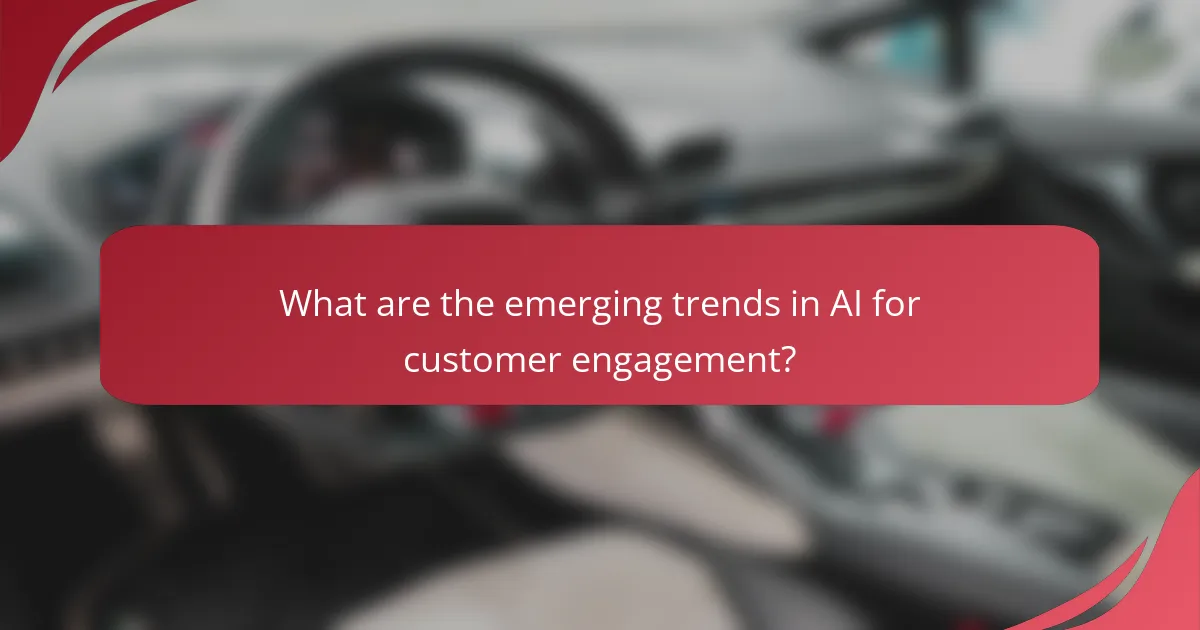
What are the emerging trends in AI for customer engagement?
Emerging trends in AI for customer engagement focus on personalization, automation, and data-driven insights. Businesses are increasingly leveraging AI tools to enhance customer interactions, streamline processes, and improve overall satisfaction.
Personalization through AI
AI enables businesses to deliver personalized experiences by analyzing customer data and behavior. This can include tailored product recommendations, customized marketing messages, and dynamic website content that adapts to individual preferences.
For example, e-commerce platforms often use AI algorithms to suggest products based on past purchases or browsing history. This level of personalization can significantly increase conversion rates and customer loyalty.
Automation of Customer Interactions
Automation is a key trend in AI for customer engagement, allowing businesses to handle inquiries and support requests efficiently. Chatbots and virtual assistants can provide instant responses to common questions, freeing up human agents for more complex issues.
Implementing AI-driven automation can reduce response times to mere seconds and improve customer satisfaction. However, it’s essential to ensure that automated solutions are well-integrated and capable of escalating issues to human representatives when necessary.
Data-Driven Insights for Engagement Strategies
AI tools provide valuable data-driven insights that help businesses refine their customer engagement strategies. By analyzing customer interactions and feedback, companies can identify trends and areas for improvement.
For instance, sentiment analysis can gauge customer satisfaction levels and highlight potential issues before they escalate. Regularly reviewing these insights allows businesses to adapt their strategies and enhance customer experiences effectively.
